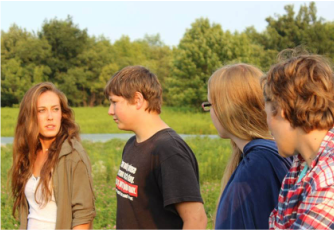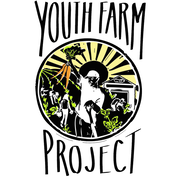 This was an eventful week as we prepared for our annual community dinner! On Monday all crews were assigned to organize, harvest, weed, and make other various decisions involving their respective fields in order to present these fields and to show families all the hard work that went into their cultivation. Both Monday and Tuesday my crew (the Thunderberrys) worked strenuously, planting row after row of kale in Field Four. Despite the blaring sun and heavy humidity, we persevered through this task, listening to music, talking, laughing, and having an overall surprisingly good time. It’s in moments like these that I remind myself how meaningful this work is. I’m sure that come fall, I will see the kale that we planted on my plate as a part of my school lunch and that the broccoli and cabbage also growing in field four, will be distributed throughout the community ending up at places like the Fresh Fruit and Vegetable Snack Program at BJM. I am grateful to know that the work I am doing on the farm is helping so many people. On Wednesday, we met at LACS and began the morning with an educational game led by Jeff Beem-Miller, who is a staff member in a lab at Cornell that focuses on the effects of climate change on agriculture. In the game, Cropopoly, each crew was assigned to a hypothetical farm in the future where extreme weather events have become more common and the government is both incentivizing and taxing agricultural activities that either mitigate man-made climate change or promote it. The crews had to make numerous decisions involving what to plant, how many fields to cultivate, how many kilograms of nitrogen fertilizer to add to crops, and how to invest money on the farm. The goal of the game was to make the most amount of money in a given amount of time. It was obviously evident that the crews planting only the typical industrial crops of corn and soybeans, made the most amount of money for the theoretical five years of farming. The crews that attempted to abide by more sustainable practices and plant more environmentally friendly crops ended up making a significantly less amount money. The point of this activity was to get us thinking about the various economic, ecological, and cultural trade-offs that farmers make and thinking how a climate change lens may influence these choices. In the short term, it is easier for farmers to profit more from solely corn and soybeans. While in the long term, a farmer who plants the same two crops over and over again will deplete soils of their organic matter, rely on external inputs: fertilizer, pesticides, seeds, which are costly, contribute to climate change, and overall create an agricultural system that is not resilient to climate change. In the long run, sustainable agriculture is more beneficial not only economically, but also environmentally, because soils will remain healthy year after year as a result of not being subjected to monoculture, intensive disturbance, pesticides/herbicides and the farmer will gradually gain a greater profit because they have reduced their need on off-farm inputs. After the fun On Thursday, all crews worked hard to prepare specific meals for that night’s dinner. My crew made pesto, a lot of pesto, using 6 pounds of freshly harvested basil from the farm. We ended up making a delicious pasta dish that seemed to be a big hit among the pesto lovers. Thursday’s dinner was an enjoyable success. It was fantastic seeing how well all the crews presented their fields and the meal was delicious. It is wonderful to see how food can foster connection, not only between people, but also between people and the environment. I am so grateful to be apart of the Youth Farm community. Written by Adrienne Wooster, 2014 Crew Leader Photo above: Adrienne presents field #4 with her crew members at the family dinner.
0 Comments
Leave a Reply. |
Archives
August 2022
Categories |
The Youth Farm Project | 24 Nelson Road, Ithaca, NY 14850 | [email protected]

 RSS Feed
RSS Feed